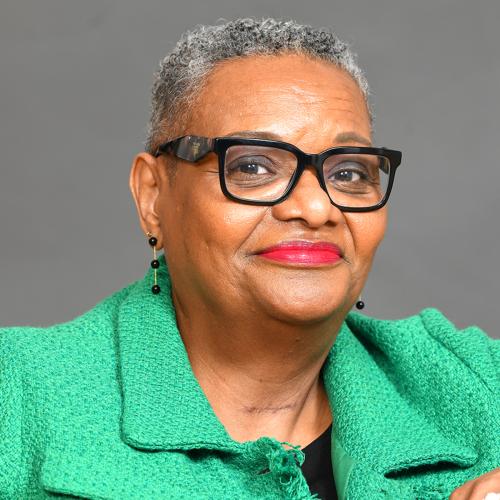Doctor of Philosophy (Ph.D.)
Christian Education and Congregational Studies
Garrett-Evangelical Theological Seminary
2015

Barbara Annette Fears, Ph.D., is Associate Professor of Religious Education at Howard University School of Divinity in Washington, D.C., where she teaches courses in the history, philosophy, and practice of ministry. In addition, Dr. Fears serves as the school's Director of Clinical Pastoral Education (CPE), where she has administrative oversight of this online program.
Dr. Fears identifies as a womanist practical theologian, a critical race theorist (CRT), and a critical pedagogue. Her research focuses on matters of power, privilege, and accountability in faith formation, praxis of faith, and curriculum development. She advises and collaborates with local churches, colleges, and colleagues to develop religious education curricula. Recent works include book chapters in two Judson Press publications (2024 & 2025) on formation, and a 2025 article on theological education in Teaching Theology and Religion Journal.
Since joining the faculty, Fears has participated twice in the Howard University Junior Faculty Summer Writing and Creative Works Academy, in two Wabash Center for Teaching and Learning in Religion sponsored Workshops: Early Career Theological School Faculty and Design Thinking for Religious & Theological Educators. She preaches by invitation, presents papers at ministerial conferences at professional meetings, and publishes and reviews papers for academic journals. In addition, Fears received an HU Provost's Distinguished Service Award (2021), was unanimously voted into the Society for the Study of Black religion in 2022, and in 2023 was recognized by Garrett-Evangelical Theological Seminary for exemplifying faithfulness, commitment, and perseverance in ministry through leadership in academic, nonprofit, and congregational settings.
Previously, Fears worked in bio-behavioral studies with Midwest Research Institute, in documentation and training with AT&T and Lucent Technologies, and in environmental, social and governance (ESG) advocacy with Wespath Investment Management formerly The General Board of Pension and Health Benefits of The United Methodist Church. She has a Master of Divinity, Master of Theological Studies in Theology and Ethics, Doctor of Philosophy in Christian Education and Congregational Studies and a Preaching Award from Garrett-Evangelical Theological Seminary. She is an Adrienne M. and Charles Shelby Rooks Fellowship recipient from and ordained clergy in the United Church of Christ, an IRB-certified human researcher, and a CPE-trained chaplain.
Christian Education and Congregational Studies
Garrett-Evangelical Theological Seminary
2015
Theology and Ethics
Garrett-Evangelical Theological Seminary
2006
Divinity
Garrett-Evangelical Theological Seminary
2005
Psychology
University of Kansas
1982
Critical Race Theory in Theological Education
Both the history of and the changing demographics within theological education demand a reckoning with the past, a close examination of the present, and a course correction for the future. Critical race theory (CRT), a framework currently under fierce political debate and intense public scrutiny, provides a lens for such a task. CRT is a misrepresented and misunderstood analytical tool that began in the field of law but has since spread to other disciplines including education and theology to study disparities across racial, religious, and gender lines. Although there is no canonical set of beliefs to which all CR theorists subscribe, in general, liberalism, claims of neutrality, objectivity, meritocracy, and colorblindness are rejected. Herein, I argue for the rejection of liberalism in theological education and offer recommendations to counter liberal tendencies in teaching, research, and service in the field.
Race, Disability and COVID-19: A DisCrit Analysis of Theological Education
The coronavirus pandemic of 2020 has generated public debate and private discussion about systemic racism in contemporary U.S. society and the ill preparedness and misdirected focus of clergy responding to this crisis. Later research will reveal reasons trained clergy called denominational offices, requesting assistance to address the needs of patients and parishioners, and initiated lawsuits demanding to gather for worship against medical advice and government mandates. While theological educators cannot anticipate every emergency awaiting graduates, U.S. history records national crises (i.e., hurricanes, mass shootings, BLM protests, etc.) that repeat. Practical theology course offerings, course content and course assignments, therefore, should be designed to prepare students to lead in anticipation of personal and communal tragedies. As professors introduce students to theory/theorists, we must also create space for the development of critical consciousness about and praxis for: problem solving, advocacy, race relations, relationship building, crisis management, identity politics, privilege, implicit curriculums and race-based disparities in health care, policing, religion, education, etc. Critical Race Theorists assert that this nation’s colonial past still plagues contemporary behaviors, employing the framework of Disability Studies and CRT (Dis/Crit), I analyze theological education to address what has been identified as racial paterfamilias in the institution, which may explain our colonial/capitalist response to COVID-19.
The Underground Railroad is the first racially integrated civil/human rights movement in the United States. The basic concepts of escape and travel that undergird the movement offer a way of envisioning the teaching/learning exchange as leaving behind unhealthy ideologies, and as journeying with students from one place of understanding to another. The primary participants and select aspects of the movement also offer a way of understanding teaching/learning in the classroom. Benefits of religious educational programming utilizing the proposed model include: developing awareness of the interrelatedness of race/racism/religion/power and a countercultural, counterhegemonic perspective that is informed by faith and evidenced by praxis.